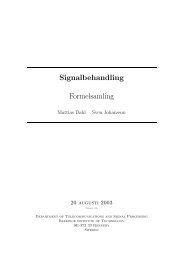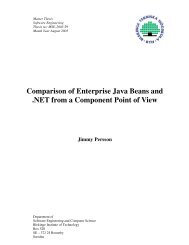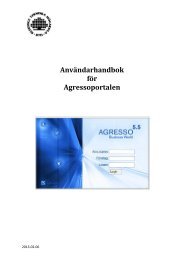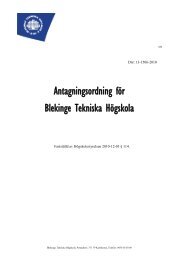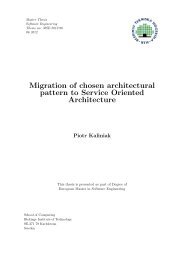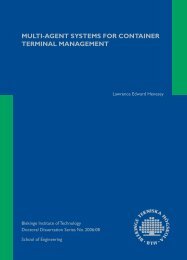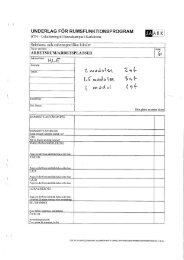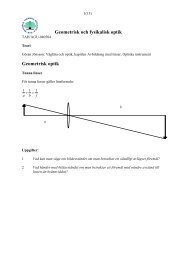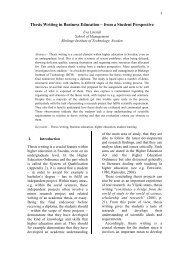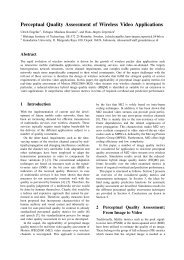ideology of <strong>SEA</strong>, how far it has developed from its origins in EIA in order to measure theenvironmental effects of plans and programmes more effectively, to a decision-makinginstrument, that shall be integrated into, and change how decisions are made. It can beconcluded from the review that much of the discussions is literary ‘context free’, excludingreference to actual implementation and have the characteristics of a rhetoric, built on alimited empirical basis. The methodological aspects of <strong>SEA</strong> practice have been discussedsince the early days of the <strong>SEA</strong> discussion, both as a part of guidance as regards the <strong>SEA</strong>application, academic literature on <strong>SEA</strong> as well as international policy instruments.Notwithstanding the methodological development in the field, a perceived lack both ofsystematic evaluations and empirical investigations remains in terms of the experiences of<strong>SEA</strong> application and the obstacles and actual effects on planning processes and planpreparations. Moreover, data regarding <strong>SEA</strong> procedures are insufficient and often incompletefor deducting lessons and capitalising on success stories (Chaker, A. et al 2006, Emmelin2006, Hilding-Rydevik 2006). When introduced to land-use planning, it can be argued that thetheoretical basis for <strong>SEA</strong> methodology is largely undeveloped, and essentially based upon theassumption that comprehensive planning is an instrumental rational decision-making process(Lawrence 2000). According to this view, <strong>SEA</strong> follows the track laid out by the environmentalplanning discourse, a track that is strongly permeated by instrumental rationality and colouredby a strong belief in the need to improve decision-making and planning with improvedinformation strategies and assumptions about the ‘value-free’ objectivity of policy analysis insupport of planning to protect environmental values. Thus, many negative characteristicsattributed to rationalism, appear equally valid for the environmental assessment process:“The EIA planning process is, for example, often autocratic and technically biased, poorly designedto match contextual characteristics and weak in planning. It, too, can be prone to artificialassumptions regarding comprehensiveness, a unitary public interest, objectivity, predictability andcontrol” (Lawrence 2000).The call for structured approaches to integrating environmental considerations, can,according to Richardson (2000), be seen in other spheres of planning in the emergence in thepost-Rio era of what could be termed ‘rational environmental planning’, where the rationaltechniques of policy analyses are used to support planning in the protection of environmentalvalues. “Examples of this is the development of techno-centric tools, including Geographic Informationsystems, computer modelling, and technically oriented project and strategic level environmental impactassessment (op.cit)”.Looking at the legal basis of the introduction of <strong>SEA</strong> in Europe, and specifically at <strong>SEA</strong>doctrine introduced by the EU directive 2001/42/EC the objectives and the definition of thedifferent steps of the <strong>SEA</strong> process reflect a view of <strong>SEA</strong> as an instrumental tool with clearlydemarcated steps. This corresponds to the objectives of the directive of providing for a highlevel of protection of the environment and to contribute to the integration of environmentalconsiderations into the planning process. However, it is not clear how the directive’s secondlystated objective of promoting sustainable development objectives can be achieved by usingthe procedural steps outlined in the directive. The actual application, i.e. whether these stepsare applied in parallel with the planning process or in an integrated way, is however left to thediscretion of the implementers of the directive. Meanwhile, although the <strong>SEA</strong> process asdescribed in the EU directive largely builds on instrumental rationality, there are also obviousparallels between the theoretical basis for <strong>SEA</strong> and the communicative strands of planningtheory. This is e.g. reflected in the requirements for public influence in the assessmentprocess through public consultation, as well as the expectations that the outcome of theassessment shall feed into the decision-making process. The potential of communicative40
planning theory in respect of environmental assessment relates to the relevance of publiceducation, involvement and shared decision-making as well as the need for fair dialogues andeffective communication, which are recurrent themes in EIA literature (Lawrence 2000).Regarding the academic discussion of <strong>SEA</strong>, some argue that the recent debates in theEnvironmental Assessment literature echo the shift in planning in the 1990s, i.e. representinga turn from instrumental rationality to communicative planning theories (Richardson 2005).However, it can hardly be argued that a shift towards applying communicative planning as atheoretical basis for <strong>SEA</strong> is universally accepted. Among the critics of communicativerationality is Fischer (2003) who argues that the quest for increased flexibility and for thegreater adaptability of <strong>SEA</strong> to the planning process can become the means to an end, thusundercutting the underlying rationale behind Environmental Assessment and the mainreasons for conducting <strong>SEA</strong> in the first place.The starting point for this research is the proposition that there are differences in theway that the <strong>SEA</strong> directive is introduced to the legal framework for planning in differentEuropean countries. Furthermore, that the countries’ national planning contexts have a majoreffect on the way that <strong>SEA</strong> is perceived and the way it will be applied. This includes that thereare differences in the perceptions of what sort of tool <strong>SEA</strong> is or could be, how it is integratedinto existing process and what effects it could have on current practice. A sound knowledgebase of the context into which <strong>SEA</strong> is introduced is therefore of crucial importance for theprocess and includes both institutional and procedural factors, as well as the cultural aspectsthat can determine planning outcomes. Furthermore, the outcome of the <strong>SEA</strong> application islargely dependent upon the proficiency and capacity of existing decision-making processes.This supposition is supported by <strong>SEA</strong> scholars. Jones et al (2005:10) state in relation to <strong>SEA</strong>and land use planning that: “Every <strong>SEA</strong> and land use planning system is unique and each is the productof a particular set of legal, administrative and political circumstances”. In order to prognosticate on theeffect of the implementation of the EU directive 2001/42/EC, improved knowledge istherefore needed on the specific planning context to which <strong>SEA</strong> is being introduced. Thisincludes the establishment of a body of systematic knowledge on existing <strong>SEA</strong> practice andon environmental integration in land use planning, as well as on the legal and institutionalframework. Hildén at al (2004) emphasise the bearing of the different views on planning onthe role of environmental assessment:“Different view of planning lead to very different interpretations of what the assessment can and shouldbe about, what they should deliver and whether <strong>SEA</strong> as a whole is a justified mean” (Hildén et al2004).On the basis of the literature review, of which the main findings have been presented, theattention is shifted to the actual experience of introducing <strong>SEA</strong> to the legal system in threecountries affected by the EU directive 2001/42/EC. Furthermore, the spatial planningframework to which <strong>SEA</strong> is introduced is described. On the basis of a review of the tangibleexperience of introducing the <strong>SEA</strong> directive, the influence of the national context on thepotential impact of <strong>SEA</strong> on the planning system and hence fulfilling its objectives ofenvironmental integration and promoting sustainable development can be discussed.41
- Page 1 and 2: sea in the context of land-useplann
- Page 4 and 5: Blekinge Institute of Technology Li
- Page 7: AcknowledgementsThis thesis has dev
- Page 10 and 11: CHAPTER 5 INTRODUCTION OF SEA TO TH
- Page 13: PART I - Introduction to the resear
- Page 16 and 17: In this research the introduction o
- Page 18 and 19: my studies and work in the area as
- Page 20 and 21: FIGURE 1.1. BASIC TYPES OF CASE-STU
- Page 22 and 23: • Process/Strategy Model; i.e. co
- Page 25 and 26: Chapter 2The SEA Directive 2001/42/
- Page 27 and 28: was extended again to also encompas
- Page 29 and 30: The plans and programmes referred t
- Page 31 and 32: effects), with less attention given
- Page 33 and 34: widespread voluntary application of
- Page 35 and 36: assessment instruments such as Risk
- Page 37 and 38: 3.1.4 The origins of SEA and its re
- Page 39 and 40: 3.2 Relevance of planning theory fo
- Page 41 and 42: development of its central ideas an
- Page 43 and 44: aspects of environmental considerat
- Page 45: FIGURE 3.2. SEA TOOLS IN RELATION T
- Page 51 and 52: Chapter 4 Introduction of SEA to th
- Page 53 and 54: to the ordinance (2005:356), the fo
- Page 55 and 56: planning area and the 0-alternative
- Page 57 and 58: 4.4 Preparation work for SEA applic
- Page 59 and 60: Housing and Planning has argued tha
- Page 61 and 62: Municipal comprehensive plans (öve
- Page 63 and 64: 4.6.2 On-going legal revisionsOn-go
- Page 65 and 66: municipal comprehensive plans (25 p
- Page 67 and 68: A pilot study on impact assessment
- Page 69: despite the committee’s suggestio
- Page 72 and 73: esources, and the community, includ
- Page 74 and 75: There amongst it shall be decided w
- Page 76 and 77: Information made available in the r
- Page 78 and 79: Environmental assessment has been i
- Page 80 and 81: Level Authority Type ofplanningDesc
- Page 82 and 83: National initiatives for sustainabl
- Page 84 and 85: limited research that has been carr
- Page 86 and 87: equired by the SEA directive. Simil
- Page 88 and 89: - Setting the context and objective
- Page 90 and 91: Screening (the determination ifthe
- Page 92 and 93: assessment for the EU structural fu
- Page 94 and 95: Level Authority Type ofplanningDesc
- Page 96 and 97:
experience of sustainability apprai
- Page 98 and 99:
ensuring that environmental assessm
- Page 100 and 101:
The second issue that raises some q
- Page 103 and 104:
Chapter 7 A Comparative Description
- Page 105 and 106:
system. This notion is reinforced b
- Page 107 and 108:
Who decides?The authorities respons
- Page 109 and 110:
plans at the municipal level (Impac
- Page 111 and 112:
experience of assessing the plan’
- Page 113 and 114:
preconditions for the introduction
- Page 115 and 116:
that the directive has spurred the
- Page 117 and 118:
the SEArequirements,i.e. whichplans
- Page 119 and 120:
Chapter 8 FindingsThe aim of the re
- Page 121 and 122:
importance of improved knowledge an
- Page 123 and 124:
At the same time HB has had access
- Page 125 and 126:
References and documentsAlfredsson,
- Page 127 and 128:
Christoferson, I. (ed), (2001) Swed
- Page 129 and 130:
Kørnøv, L. (1999) Integrating SEA
- Page 131 and 132:
Sheate, W., Byron, H., Dagg, S. and
- Page 133 and 134:
European Union’s publicationsEC (
- Page 135 and 136:
English documents:Countryside Counc



